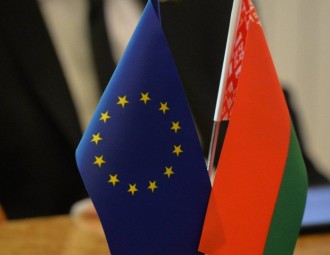Belarusian state is unlikely to allow any initiative that could destroy the state’s monopoly on power
 sputnik.by
sputnik.by
Under the pressure of normalising relations with the EU, the Belarusian authorities are ready to widen opportunities for a dialogue with its opponents.
As European politicians are focused on the ‘process’ rather than the ‘outcome’, the Belarusian authorities are likely to somewhat liberalise the political environment, however without enabling the opposition or civil society representatives in the decision-making process.
At a press briefing in the Belarusian Foreign Ministry, the Ministry’s Press Officer Dmitry Mironchik said, that the next round of human rights dialogue between the EU and Belarus would be held in Minsk on June 7th.
Amid low popularity of the opposition, the virtual lack of opportunities for them to participate in the political process and low protest activity of the electorate, the Belarusian authorities are ready to demonstrate progress in political freedoms and human rights. However, Belarus’ vision of democracy and human rights guarantees is different from those required by the EU.
President Lukashenka has repeatedly emphasised his peculiar understanding of human rights, which boils down to ensuring safety and socio-economic rights, such as the right to life and "the right to work, the right to a decent wage, so that one could pay utility bills and feed the family”.
Amid Belarusian-European normalisation, the president has allowed somewhat more liberal interpretation of human rights, which includes the freedom of expression, but only in a certain place at a certain time, "... the human right is to say what one thinks in the right place: at a meeting, while discussing with colleagues, straight in your eyes, there is no need to be afraid. We will gain points for this. But at work, one should be, roughly speaking, sewn up, because technology dictates there. If you see that something is wrong, warn your chief, make a suggestion".
The president prescribed a more tolerant attitude towards alternative views, which will facilitate, for example, the launch of a dialogue between the authorities and their opponents. For instance, independent media representatives have been invited to participate in discussions on the state TV channels.
Nevertheless, it is clear that the senior management is gravely concerned about the possible rise in protests among workers. The president has ordered the government to apply harsh measures to curtail strikes and other protest activity, which could grow into labour movement similar to that in the late 1980s and early 1990s.
Yet for Belarus, the Belarusian-European normalisation is an economic necessity. While visiting Italy, the president demonstrated high interest in the economic cooperation and investment. Right after his return to Belarus, President Lukashenka attempted to convince Italian businessmen to invest in the Belarusian economy. However, instead of state guarantees of the investor’s rights Lukashenka promised to them personal assistance in doing business in Belarus: "Let’s start small. Two or three projects, I will supervise them personally”.
Such an approach to doing business is common in the post-Soviet space, where the state’s role in the economy is high. In European countries, such a statement by the top official would be treated ambiguously.
The desire to attract foreign investors and state managers’ inability to pull the economy out of the crisis has prompted the Belarusian leadership to open the country a little bit. For instance, Foreign Minister Vladimir Makei and the head of the Republican Confederation of Entrepreneurship Vladimir Karyagin have signed a cooperation agreement for 2016-2020.
Overall, the Belarusian authorities are willing to make some concessions in the economic sphere. However, the Belarusian authorities are unlikely to allow any initiative which, in their opinion, could destroy the core mechanisms ensuring the state’s monopoly on power and which are not included in the European requirements for the preservation of a dialogue with the EU, as viewed by the Belarusian authorities.
-
03.01
-
07.10
-
22.09
-
17.08
-
12.08
-
30.09








































